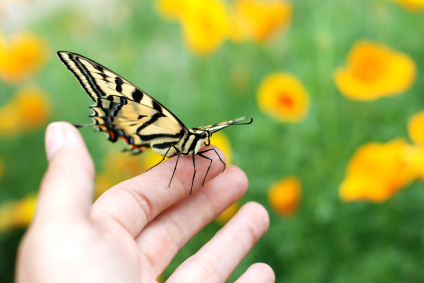Embracing Joy and Sorrow Fearlessly by Letting Go

I recall when I first started studying Buddhism how surprised and unsettled I felt at all the talk of dispassion and letting go. I’ve been one to enjoy life, and to express great passion for many things. When I read that passion lead to suffering because underlying it was a lot of craving and attachment, I adamantly disagreed. My passion for nature, for science, for learning were what made life worth living for me. What would happen if I let go, if passion dissolved into equanimity? For a long time I didn’t even want to explore the possibility.
But you can’t practice mindfulness in general and not see the workings of craving and desire in your life. In the beginning of my practice, I had no problem looking at attachments I had to areas I knew that were creating suffering for me. But little by little, I looked under the hood of the fun stuff of life, and lo and behold I discovered attachments, desire, craving, and dissatisfaction.
As I hiked through the redwoods one day, I was practicing mindfulness and being in the moment. It surprised me how challenging that was since I enjoy the forest so much. I hadn’t realized previously how often my mind wanders of the trail, far away from the trees, into the business of thoughts. I continually brought my attention back to the present, to the trees beside me.
I took in the sweet aroma of pines, listened to the occasional dropping of water onto leaves, and felt the cold air on my skin. I realized in that moment, I had no expectations, no clinging to desired outcomes, no need to be something other than a hiker through the forest. Whatever the trail brought, I observed and enjoyed.
But as I headed back to my car, I felt reluctance bubbling up within me. I turned back to the forest, and found myself directly looking into the attachment I have to the pleasure of being among the redwoods. Already desire to return frustrated those last few minutes of being there I had in the present. I wondered then if it was possible to enjoy anything without the expectation of more, without some clinging to a desired extended outcome?
Buddhists are often accused of avoiding emotions and being indifferent to situations. But that is a misunderstanding, at least from what I have discovered in my own practice. From the very start with mindfulness meditation, I found myself repeatedly and intently, engaging with an emotion far more deeply than I ever had in the past. In fact, my defense mechanism of the past had been to avoid feelings of sorrow, sadness, and anger.
But the mindfulness practice, by its very nature, allows us to sink into the heart of an emotion and get under the layers to see what is really going on, instead of riding on the surface, caught in the story, spun up by our rapid thoughts. Instead of avoiding sadness, trying to move out of it into a happier place, I found myself more often than not, sitting with it, exploring the feeling of the emotion in my body, and letting go of the thoughts that were so crucial in keeping sadness alive.
As I learned to sit with emotions like sadness and anger and experience them more intimately, I also found I let go of the fear of them, and I let go of any expectation about them. In doing that, I found a freedom like I had never experienced before, and equanimity I had read about but thought was impossible.
Once I was able to reach equanimity with sadness and anger through embracing and letting go, I realized I wanted to explore those areas where I feel great pleasure and passion. Immediately, the desire for longevity of those feelings appeared. With the discovery of the desire, I also saw how I clung to the pleasantness of a situation, how I want it to last. How incredibly difficult it is to let go of the expectation of peace.
Eventually, by working with an area I feel safest, the forest, I discovered I could let go of expectation, of desire, and when I did I experienced a greater freedom. Now, I can enjoy the forest fearlessly, because I no longer have those attachments. Joy that comes out of equanimity doesn’t have the heavy weight of happiness with strings attached. Fearless joy is lighter, totally free. Amazingly, there is no fear of it disappearing.
I like the image of the butterfly in the open hand. Even better are those butterflies that flit from flower to flower. Butterflies are most beautiful when they are free. It’s a wonderful metaphor for me to remember when I find craving or attachment underlying something I enjoy. Can I recognize the cause of that craving, then let go of the craving, and hence enjoy it a free manner,with equanimity?
I don’t know if I’ll ever achieve that in all areas of life, but in the places I have totally let go, I noticed that I embrace with abandon, fearlessly and tirelessly.
